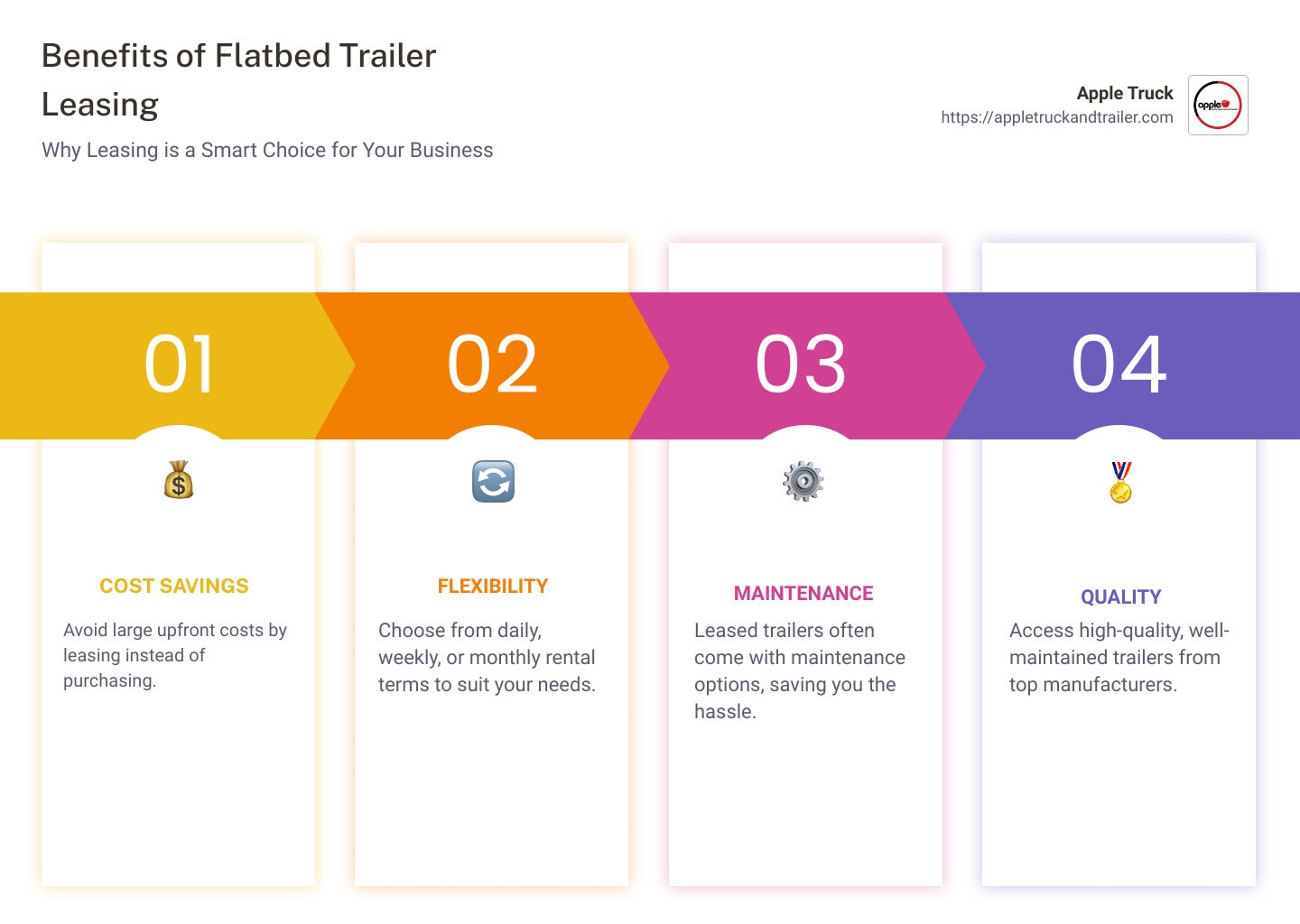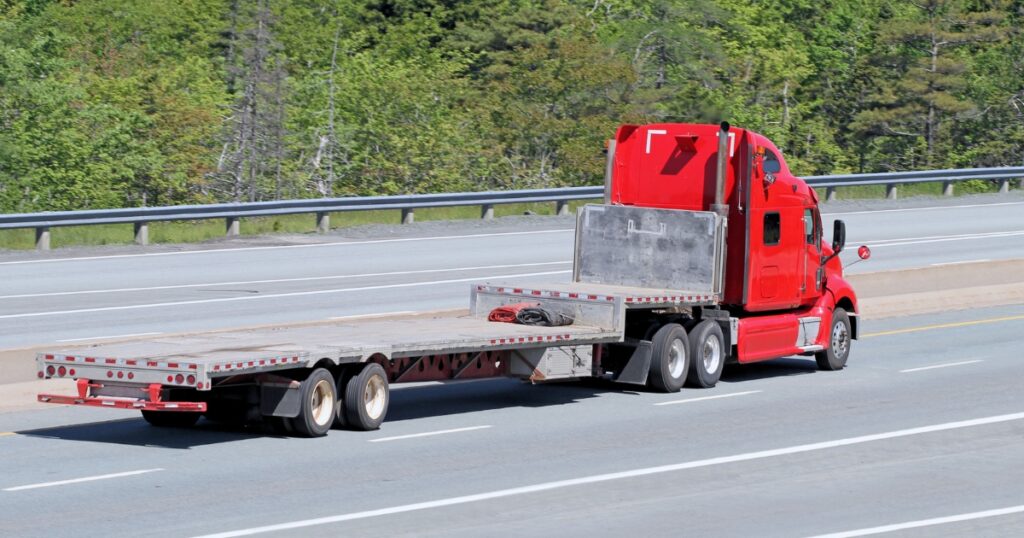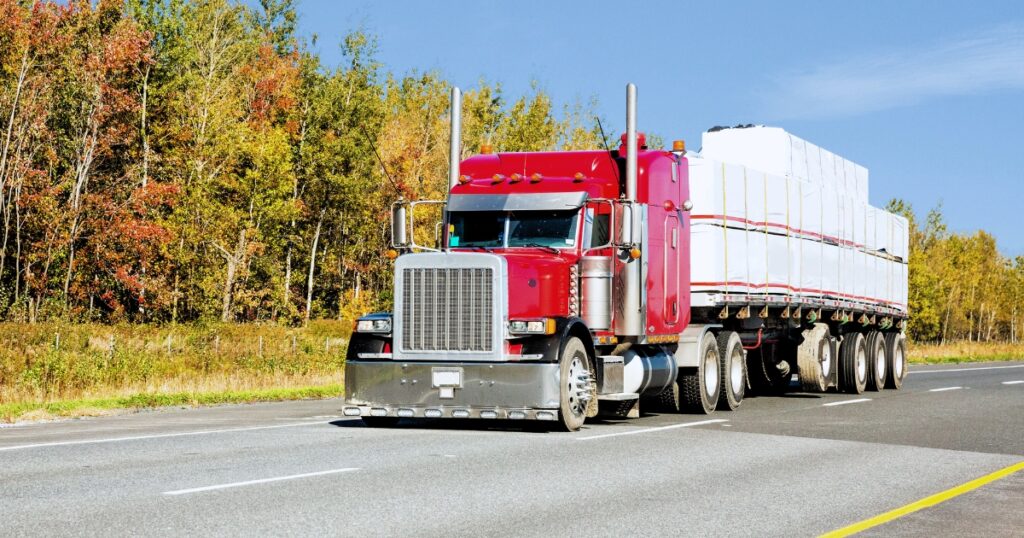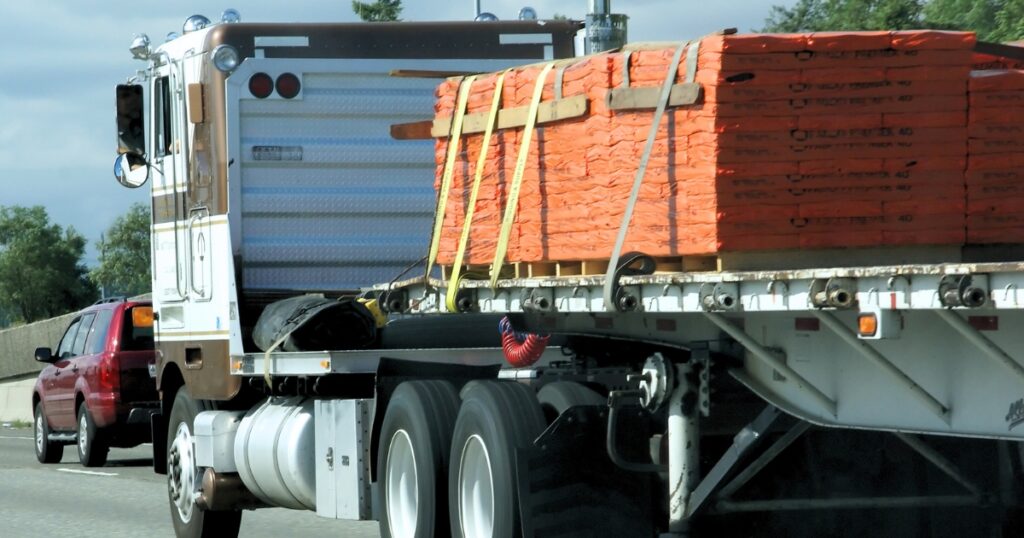Why Flatbed Trailer Leasing is a Smart Choice for Your Business
If you’re looking for flatbed trailer leasing options, you’ve come to the right place. Renting a flatbed trailer can be a flexible and cost-effective solution for your business’s hauling needs. Whether you’re a small business owner in Massachusetts or a homeowner in need of extra storage for moving, leasing a flatbed trailer offers several advantages.
4 Key Benefits of Flatbed Trailer Leasing:
- Cost Savings: Avoid large upfront costs by leasing instead of purchasing.
- Flexibility: Choose from daily, weekly, or monthly rental terms to suit your needs.
- Maintenance: Leased trailers often come with maintenance options, saving you the hassle.
- Quality: Access high-quality, well-maintained trailers from top manufacturers.
My name is Michael Sensano, and I bring years of expertise in the flatbed trailer leasing industry. With a degree in Mechanical Engineering and experience in the truck and trailer market, I’m here to guide you through every step of the leasing process.
By choosing to lease a flatbed trailer, you can ensure that your business remains efficient and cost-effective without compromising on quality.

Table of Contents
What is Flatbed Trailer Leasing?
Flatbed trailer leasing is a process where you rent a flatbed trailer for a specific period instead of buying it outright. This allows businesses to use high-quality trailers without the hefty upfront costs.
Purpose of Flatbed Trailer Leasing
The primary purpose of leasing a flatbed trailer is to provide businesses with the flexibility to meet their transportation needs without long-term commitments. Leasing is ideal for businesses that:
- Have fluctuating transportation needs: Seasonal businesses or those with varying shipment volumes can benefit from leasing.
- Want to avoid high upfront costs: Leasing spreads the cost over time, freeing up capital for other investments.
- Need flexibility in equipment: Leasing allows businesses to upgrade or change equipment as needed without the hassle of selling old trailers.
Types of Flatbed Trailers
Flatbed trailers come in various types to suit different hauling needs. Here are some common types:
- Standard Flatbed Trailers: These are versatile and can carry a wide range of loads. They typically range from 48 to 53 feet in length and 96 to 102 inches in width.
- Single Drop Flatbed Trailers: Also known as step-deck trailers, they have a lower deck to accommodate taller loads. They are usually 37 to 53 feet long and 102 inches wide.
- Extendable Flatbed Trailers: These trailers can extend in length to carry oversized cargo. They range from 45 to 80 feet in length and 96 to 102 inches in width.
- Curtainside Flatbed Trailers: These provide extra protection with a curtain that can be pulled over the load, ideal for sensitive cargo.
- Steel Extendable Flatbeds: Designed for oversized cargo, these trailers offer additional length flexibility.
- Steerable Axle Flats: These are used for loads that require precise maneuverability.
Leasing Flatbed Trailers from Apple Truck & Trailer
At Apple Truck & Trailer, we offer a wide selection of flatbed trailers to meet your specific needs. We provide flexible leasing terms, ranging from daily to multi-year agreements, to ensure that you get the best deal for your business.
Michael Sensano, our expert in flatbed trailer leasing, is here to guide you through the process, ensuring that you find the perfect trailer for your needs. With our well-maintained fleet and top-notch customer service, you can focus on your business while we take care of your transportation needs.
Next, we’ll dive into the benefits of leasing a flatbed trailer and how it can save you money and provide flexibility for your business.
Benefits of Leasing a Flatbed Trailer

Leasing a flatbed trailer comes with numerous advantages that can make a significant difference for your business. Let’s explore the key benefits: cost savings, flexibility, maintenance, and tax benefits.
Cost Savings
Leasing a flatbed trailer can be more cost-effective than purchasing one outright. When you lease, you avoid the large upfront capital expenditure and instead make manageable monthly payments. This means more working capital for other business needs.
“We have rented 1-2 units while we were in the process of moving over the course of 4 months, so far! Everyone we have dealt with, from the office staff, to the delivery person have all been very professional,” says a satisfied customer from Apple Truck & Trailer.
Flexibility
Leasing offers unmatched flexibility. Whether your needs are short-term or long-term, you can choose rental terms that fit your specific requirements. At Apple Truck & Trailer, we offer daily, weekly, monthly, annual, and multi-year leases, so you can adapt as your business evolves.
Maintenance
One of the biggest perks of leasing is that maintenance is often included. At Apple Truck & Trailer, we provide a range of maintenance options, from basic upkeep to full-service plans. This ensures that your flatbed trailer is always in top condition without extra hassle or costs on your part. As noted in our research, “Hale Trailer offers technicians on hand to ensure that your trailer is meticulously serviced to ensure it can go the distance.”
Tax Benefits
Leasing a flatbed trailer can also offer significant tax advantages. Lease payments are often considered a business expense, which can be deducted from your taxable income. This means you can enjoy the benefits of using the trailer while reducing your tax liability.
By understanding these benefits, you can make an informed decision about whether leasing a flatbed trailer is the right choice for your business.
Next, we’ll guide you through the steps and requirements for leasing a flatbed trailer, ensuring a smooth and straightforward process.
How to Lease a Flatbed Trailer

Leasing a flatbed trailer can seem daunting, but with the right information, it can be a breeze. Here’s a simple guide to help you navigate the flatbed trailer leasing process.
Steps to Lease a Flatbed Trailer
- Determine Your Needs: Identify the type of flatbed trailer you need. Consider the cargo you’ll be hauling and the distances you’ll be traveling. Do you need a standard flatbed, a drop deck, or an extendable model?
- Research Leasing Companies: Look for reputable leasing companies. Check their inventory, customer reviews, and service offerings. Apple Truck & Trailer, for example, offers a wide range of high-quality trailers with flexible leasing terms.
- Get a Quote: Contact the leasing company to get a quote. Provide details about your hauling needs and the lease duration you’re interested in.
- Inspect the Trailer: Before signing any agreements, inspect the trailer. Ensure it meets your requirements and is in good condition. Look for any signs of wear and tear that could affect your operations.
- Review the Lease Agreement: Carefully read the lease agreement. Pay attention to the lease terms, maintenance responsibilities, and any potential hidden fees. Make sure you understand all the conditions before signing.
- Sign and Secure the Trailer: Once you’re satisfied with the terms, sign the lease agreement. Arrange for the trailer to be delivered or pick it up from the leasing company’s location.
Requirements for Leasing a Flatbed Trailer
To lease a flatbed trailer, you typically need:
- A Valid Business License: Most leasing companies require proof that you’re a legitimate business.
- Credit Check: Be prepared for a credit check. Leasing companies want to ensure you can make the lease payments.
- Insurance: You may need to provide proof of insurance. This protects both you and the leasing company in case of accidents or damage.
- Initial Payment: Some companies require a deposit or the first month’s lease payment upfront.
Documentation Needed
When leasing a flatbed trailer, you’ll need to provide several documents:
- Business License: Proof of your business’s legal status.
- Insurance Certificate: Documentation of your insurance coverage.
- Credit Information: Details for the credit check.
- Identification: Valid ID, such as a driver’s license or passport.
The Leasing Process
- Application: Fill out the leasing application form. This usually includes your business details, credit information, and the type of trailer you’re interested in.
- Approval: The leasing company will review your application. They might conduct a credit check and verify your business details.
- Agreement: Once approved, you’ll receive a lease agreement. Review it thoroughly and ask any questions before signing.
- Payment: Make the initial payment as specified in the agreement. This could be a deposit or the first lease installment.
- Pickup/Delivery: Arrange for the trailer to be delivered to your location or pick it up from the leasing company.
- Ongoing Maintenance: Depending on your lease terms, you may need to handle maintenance. Some companies offer full-service maintenance plans.
Cost of Leasing a Flatbed Trailer

When it comes to flatbed trailer leasing, understanding the costs involved is crucial. Here, we’ll break down the factors affecting cost, average costs, and potential hidden fees.
Factors Affecting Cost
- Lease Duration: The length of your lease significantly impacts the cost. Short-term leases (daily or weekly) are more expensive per day compared to long-term leases (monthly or annually). For example, Hale Trailer offers flexible terms ranging from daily to multi-year leases.
- Trailer Type: Different types of flatbed trailers come with different price tags. Standard flatbeds, extendable flatbeds, and curtainside flatbeds each have their own cost structures. Specialized models like single drop flatbeds may also affect the lease price.
- Maintenance Plans: Maintenance options can add to the cost. Opting for a full-service maintenance plan ensures your trailer is always in top condition but will increase your monthly payments. Hale Trailer, for instance, provides various maintenance plans from net-net to full-service.
- Location: Where you lease your trailer can also affect the cost. Leasing in high-demand areas like California may be more expensive compared to other regions.
Average Costs
The average cost of leasing a flatbed trailer can vary widely based on the factors mentioned above. Here’s a general idea of what you might expect:
- Daily Lease: $50 – $100
- Weekly Lease: $200 – $400
- Monthly Lease: $600 – $1,200
- Annual Lease: $7,000 – $15,000
These are rough estimates and can vary based on the specific terms and conditions of your lease agreement.
Hidden Fees
Be aware of potential hidden fees that can add up quickly:
- Initial Deposit: Some leasing companies require a deposit, which can be a significant upfront cost.
- Late Fees: Returning the trailer late can result in hefty late fees. Always check your contract for details.
- Mileage Limits: Exceeding the mileage limits set in your lease agreement can incur additional charges.
- Customization Fees: If you need specific customizations, these may come with extra costs.
- Damage Charges: Any damage to the trailer not covered by your maintenance plan can result in additional fees.
Understanding these cost factors, average costs, and hidden fees will help you budget effectively and avoid unexpected expenses. Next, we’ll share some top tips for leasing a flatbed trailer to ensure you get the best deal possible.
Top Tips for Leasing a Flatbed Trailer

Leasing a flatbed trailer can be a smart move for your business, but it’s important to approach it wisely. Here are some top tips to help you get the best deal and avoid common pitfalls.
Inspection Tips
- Check for Wear and Tear: Before signing a lease, inspect the trailer for any signs of wear and tear. Look for rust, cracks, and other damage. A well-maintained trailer will save you headaches down the road.
- Verify Maintenance Records: Ask for the trailer’s maintenance history. Regular maintenance is key to a trailer’s longevity. Hale Trailer offers meticulously serviced trailers, ensuring they can go the distance.
- Test All Features: Make sure all features, like the braking system and lights, are in good working order. Don’t forget to check the tires and suspension.
- Measure Dimensions: Ensure the trailer’s dimensions meet your needs. Hale Trailer offers trailers ranging from 36’ to 53’ in length and 96” to 102” in width.
Negotiation Tips
- Know the Market Rates: Do some research to understand the average leasing rates. This will give you a strong position when negotiating. For example, Apple Truck offers competitive rates and flexible terms.
- Ask for Flexible Terms: Negotiate for terms that suit your business needs. Whether you need daily, weekly, monthly, or multi-year terms, flexibility can save you money in the long run.
- Bundle Services: If you need multiple trailers or additional services like maintenance, ask for a bundled deal. This can often lead to discounts.
- Negotiate Maintenance Plans: Maintenance can be a significant cost. Negotiate for a maintenance plan that covers regular upkeep. Hale Trailer offers full-service maintenance plans that can be included in your lease.
Contract Review
- Read the Fine Print: Carefully read the lease agreement. Look for hidden fees and understand the terms and conditions. Common hidden fees include mileage limits and damage charges.
- Clarify Customization Options: If you need to customize the trailer, ensure that the lease agreement allows for it. Some leases may have restrictions or additional costs for customization.
- Understand End-of-Lease Terms: Know what happens at the end of the lease. Can you buy the trailer? Are there renewal options? Understanding these terms can help you plan for the future.
- Get Everything in Writing: Verbal agreements are not enough. Make sure all negotiated terms are included in the written contract.
By following these tips, you can ensure that your flatbed trailer leasing experience is smooth and cost-effective. Next, we’ll answer some frequently asked questions about flatbed trailer leasing to clear up any remaining doubts.
Conclusion
Leasing a flatbed trailer can be a smart move for businesses looking to save on upfront costs, enjoy flexibility, and benefit from maintenance support. Whether you need a trailer for a short-term project or a long-term commitment, flatbed trailer leasing offers a range of options to meet your needs.
At Apple Truck and Trailer, we pride ourselves on providing high-quality trucks and trailers. Our wide selection ensures that you can find the perfect trailer to fit your specific requirements. Plus, our commitment to customer service means you’ll always have the support you need.
Here’s what our customers have to say:
“When I called and said I needed a container ASAP, they arrived at my house the next morning with a very clean and practically new container. All of my dealings with this company have been top notch professional. And, they are cheaper than any competitors in this area. I definitely recommend them and wouldn’t hesitate to call on them again.” – Nancy S.
“I had a box truck that I had owned for a couple of years that needed a bunch of stuff done to it I thought but I brought it into these guys. The owner introduced himself wanted to know a little bit about my fleet and my company. Although I’m not the biggest customer they gave me time and attention. I will definitely be bringing all of my commercial vehicles to them.” – Premier Sealcoating
Leasing a flatbed trailer from us is a hassle-free experience. We offer flexible terms, a variety of trailer types, and comprehensive maintenance options. Our goal is to keep your business moving forward without any roadblocks.
Ready to lease your next flatbed trailer services? Contact us today to learn more about our leasing options and how we can help you find the perfect trailer for your business.
Thank you for considering Apple Truck and Trailer for your flatbed trailer leasing needs. We look forward to serving you and keeping your fleet on the road!
Frequently Asked Questions about Flatbed Trailer Leasing
What are the typical lease terms for flatbed trailers?
When leasing a flatbed trailer, lease durations can vary widely to suit different needs. Common options include:
- Daily: Ideal for short-term projects.
- Weekly: Suitable for medium-term needs.
- Monthly: Perfect for longer projects or seasonal demands.
- Annually or Multi-Year: Best for long-term commitments.
Mileage limits are another crucial factor. Some leases come with mileage caps, while others offer unlimited mileage. Always clarify this to avoid unexpected charges.
Renewal options are typically available at the end of the lease term. You can often renew the lease under similar terms or negotiate new ones. Always check the renewal policy before signing.
Can I customize a leased flatbed trailer?
Yes, customization options are usually available, but they come with some restrictions. Common customizations include:
- Adding protective features like curtainsides.
- Modifying the trailer for specific cargo needs.
However, be aware of additional costs associated with these modifications. Always get approval from the leasing company before making any changes to avoid penalties.
What happens at the end of the lease term?
At the end of the lease term, you’ll have several options:
- Return the Trailer: Inspect the trailer and ensure it meets the return conditions to avoid extra charges.
- Purchase Options: Some leases offer the option to buy the trailer at a predetermined price.
- Lease Renewal: You can renew the lease if you need the trailer for a longer period. This can often be negotiated under similar or new terms.
Understanding the return process is crucial. Make sure you know the condition requirements and any associated fees for wear and tear.
By knowing these details, you can better manage your flatbed trailer leasing experience and make informed decisions.
OUR CONTENT
All the information you find on our website is thoroughly researched and verified by our team of truck and trailer specialists, who bring over 40 years of experience to Auburn, Massachusetts, and the surrounding areas. At Apple Truck and Trailer, we’re all about great service and quality trailers. Ours aren’t just trailers; they’re custom solutions for your transport needs. We understand how important reliability is for your business, and we’re here to help every step. Check out our Landoll trailers, long haul transport, semi trailer trucks, semi truck leases and secure storage containers for an upgrade with expert support. We’re dedicated to providing content that’s not only accurate but also meaningful and useful for our readers.

